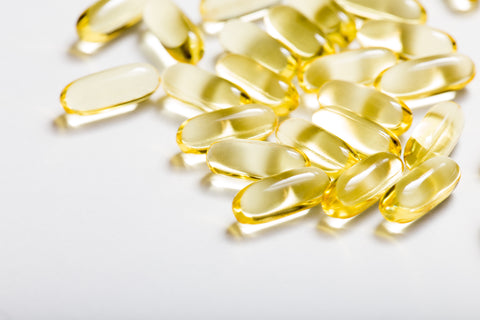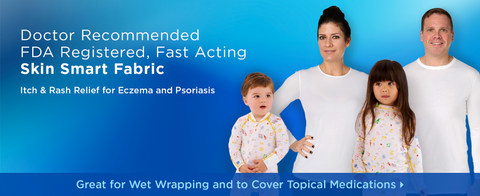Vitamin D: What are the Health Benefits for Eczema?
The link between vitamin D insufficiency and deficiency and atopic dermatitis (eczema) may not be as clear as some research has proposed. No argument that vitamin D promotes calcium and phosphate absorption, and is needed to maintain the growth of healthy bones, muscles, and increase immunity from some serious diseases. A study in the British Medical Journal found that increasing vitamin D intake reduces the risk of colds, flu and other respiratory infections like pneumonia but there are conflicting research results on whether vitamin D levels really have a bearing on eczema and psoriasis. But does vitamin D deficiency really impact eczema? In this blog, we try to sort out fact from fiction about vitamin D benefits and eczema prevalence, severity, treatment, and prevention.
How do we get Vitamin D?
1. Sun & Vitamin D:

When you think of vitamin D many of us associate sunshine as a primary source, which is correct. When sunshine or ultraviolet rays from sunlight interact with the skin it triggers a vitamin D synthesis. Vitamin D intake is so closely aligned with sun exposure that many call vitamin D the “Sunshine Vitamin”.
2. Vitamin D Foods:
There are only a few foods that Vitamin D is naturally present and there are three forms of vitamin D in foods:
- Vitamin D2: Found in some types of mushrooms.
- Vitamin D3: The more potent form of vitamin D which is contained in egg yokes, oysters, shrimp, and certain oily fish such as tuna, salmon, cod liver oil, and sardines & herring.

- Foods Fortified with Vitamin D3: Due to a vitamin D deficiency in many Americans (estimated overall to be 42 percent and as high as 80 percent in some ethnic groups), vitamin D3 is added or fortified to other health essential foods like milk, orange juice, processed bread, and even some breakfast cereals.
3. Vitamin D3 Supplements:
Vitamin D3 is available as a dietary supplement. The daily supplement dose recommended by the US Institute of Medicine is 10 – 20mg (or 400 – 800IU). Many health care professionals recommend increasing the dosage of vitamin D3 during the autumn and winter months when many people are likely to get less vitamin D from sunshine. Choose your brand of vitamin D3 supplements carefully as the FDA regulates but does not monitor the safety of purity of supplements.

Does Vitamin D Deficiency Cause Eczema?
Research studies sponsored by the Vitamin D Council, (a 501c nonprofit promoting the consumption of vitamin D supplement), have made a coherent argument that low vitamin D levels have increased the incidences of asthma, eczema, psoriasis and an immune molecule linked to other allergies and they have attempted to link successful treatment of asthma, eczema, and psoriasis to increased levels of vitamin D3. The Vitamin D Council’s research correlates conclusions that having high enough levels of vitamin D3 may reduce your risk of developing eczema and psoriasis and the prevalence of eczema and psoriasis flareups. And that people with normal to higher levels of vitamin D3 will help manage eczema flareups and they will have fewer skin infections.
Does Vitamin D3 Stop Eczema Itching: True or False?
Conversely, there are numerous other scientific and medical studies about the relationship between vitamin D3 deficiency and eczema that conclude taking vitamin D3 supplements for eczema, asthma, and psoriasis does not help reduce the occurrence of psoriasis or atopic dermatitis and not help relieve the itchiness. The facts and controversies about the relationship of atopic dermatitis and vitamin D3 are laid out in a very technical and detailed research article worth reading from the US National Library of Medicine and the National Institutes of Health.
A prominent and leading 2017 study from a team of Canadian researchers led by Dr. Brent Richards, MD, and Dr. Despoina Manousaki, Ph.D. and published in the PLOS Medicine Journal and in the American Association for the Advancement of Science (AAAS) journal confirms the clinical study results regarding the relationship between eczema and vitamin D3 deficiencies.
This wide-ranging clinical study found that increasing vitamin D level is unlikely to reduce the risk and susceptibility to asthma, elevated immunoglobulin E (IgE) levels, psoriasis and atopic dermatitis conditions in adults or children.
Dr. Despoina Manousaki, the lead author, said: "Our findings suggest that previous associations between low vitamin D and atopic disease could be due to spurious associations with other factors. Efforts to increase vitamin D levels will probably not result in decreased risk of adult and pediatric atopic dermatitis, asthma, or elevated IgE levels.”
These findings contrast with a recent study from the same group which used similar methods to provide evidence supporting a causal role for vitamin D in the risk of multiple sclerosis, a common neurological disorder. "Our previous findings suggest that low vitamin D levels increase the risk for some inflammatory diseases like multiple sclerosis, but these effects do not translate to other inflammatory diseases like asthma, psoriasis and atopic dermatitis", said Dr. Richards.
Vitamin D3 Benefits and Eczema Treatments - Conclusion:
It won't protect you against asthma, plaque psoriasis, atopic dermatitis or most other allergies based on results from this very credible clinical study by academic researchers, health care professionals, and nutrition experts. Conclusively the research indicates that vitamin D has no real effective impact on the occurrence, and severity health conditions such as atopic dermatitis, asthma, and plaque psoriasis.
Should I add Vitamin D Supplements to my Eczema Diet?
If you have eczema the short answer is yes because there are outlying reasons for why you likely have insufficient or low levels of vitamin D and possibly even a deficiency of vitamin D. What is underlying most the medical research and clinical studies and some very practical points that low levels of vitamin D and eczema can be related when you consider the spurious associations Dr. Manouaski refers too in his 2017 research.
- Many eczema suffers have Atopy Syndrome, the high propensity to have several other allergies including food allergies. Therefore it makes sense that because of 37 percent of children suffering from eczema commonly have allergies to foods such as vitamin D3 fortified dairy milk, bread with gluten, and other foods rich in natural vitamin D like eggs, shellfish and oily fishes are inadvertently taking in less vitamin D3 than people without eczema and these commonly associated to eczema-food allergies.
- Almost 80 percent of childhood eczema sufferers deal with the Atopic Triad (Asthma, Atopic Dermatitis, and Hay Fever) and triggers like pollen and air pollution so they stay indoors and therefore do not get as much sunshine vitamin D as a group than children that do not have eczema.
- Ultraviolet Radiation Benefits & Eczema Treatment: Dermatologists frequently recommend that people with eczema and psoriasis expose their eczema rashes and plaque psoriasis skin to moderate amounts of sunlight to increase vitamin D levels as a healthy natural eczema treatment. They also recommend that if you are going to extend your sun exposure beyond 10 – 15 minutes you should always wear sun a mineral sunscreen with active ingredients of either titanium dioxide (TiO2) or zinc oxide (ZnO) such as Cotz SPF 40 and UPF 50+ clothing from a reputable brand like Coolibar. Too much sun can permanently darken rash scars.
What are Effective Eczema Treatments?
If you read through this article this far you already know that eczema is a skin condition characterized by very itchy, red, dry, sensitive skin rash that can crack and weep fluids in moderate to severe eczema cases. You also probably know there are thousands of potential triggers, and that there is no cure, but there are many different treatments can help improve the skin's condition, making life easier.
The best recommendations for treating eczema are:
- Learn what triggers your eczema flareups. You may not ever have the exact causes or eczema triggers but knowing as many potential triggers as you can help you avoid many of them.
- Keep your skin moisturized day and night with high-quality moisturizing emollients and creams like Vanicream.
- Bath frequently but for no more than about ten minutes at a time in lukewarm water using only very mild, fragrance-free soaps only if needed to remove overgrowth and bacteria. Try therapeutic bath additives such as apple cider vinegar, colloidal oatmeal, coconut oil, Epsom salts or bleach bath (consult your dermatologist for what they believe will be most beneficial for your specific eczema symptoms).
- Pat dry the skin after the bath with a soft towel so as not to irritate the sensitive skin further. Cover the skin with more moisturizers. We recommend Vaniply emollient because of its thick greasy texture adds extra protection against nighttime itching.
- For your best night’s sleep cover the freshly bathed, moisturized skin with Soothems eczema pajamas to protect the emollient from smearing off and break the nightly itch/scratch cycle. Soothems are made from a special TENCEL™ fiber blend fabric called TEWLTect®. This FDA registered skin smart eczema and psoriasis fabric helps relieve itching, is temperature regulating, enhances breathability, controls skin moisture levels and has Chitosan and Zinc Oxide embedded in the fibers permanently for bacteria control, skin healing and to help control the unsatiable, constant itching associated from eczema and psoriasis flareups. Research has proven the efficacy of zinc oxide infused fabric is very as being highly effective for treating eczema.
- For moderate to severe eczema and psoriasis, flareups ask the dermatologist about Wet Wrap Therapy. Wet wrapping is simpler than it sounds and if you wet wrap with special eczema clothing like Soothems it does not need to be uncomfortable.





Leave a comment
All comments are moderated before being published.
This site is protected by hCaptcha and the hCaptcha Privacy Policy and Terms of Service apply.